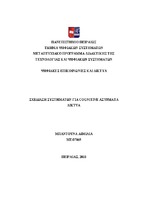Σχεδίαση συστημάτων για cognitive ασύρματα δίκτυα

Master Thesis
Συγγραφέας
Μπαντούνα, Αιμιλία
Ημερομηνία
2011-01-18Προβολή/
Θεματική επικεφαλίδα
Cognitive learning ; Cognitive radio networks ; Self-organizing systems ; Wireless communication systems ; Software radio ; Wide area networks (Computer networks)Περίληψη
Cognitive radio systems (CRSs) have been proposed as a promising technology for intelligently handling the rapid evolution of wireless communications, especially in terms of managing and allocating the scarce, radio spectrum in the highly varying and disparate modern environments. A typical CRS implements a so called “cognition cycle”, during which it senses its environment, evaluates a set of candidate radio configurations to operate with and finally decides and adjusts its operating parameters expecting to move the radio toward an optimized operational state. Such a process is often proved to be rather arduous and time consuming. Accordingly, learning mechanisms that are capable of exploiting measurements sensed from the environment, gathered experience and stored knowledge can be judged as rather beneficial in terms of speeding up the whole cognition process. Framed within this statement, this paper introduces and evaluates a mechanism which is based on a well-known unsupervised learning technique, called Self-Organizing maps (SOM), and is used for assisting a CRS to predict the bit-rate that can be obtained, when it senses specific input data from its environment, such as Received Signal Strength Identification (RSSI), number of input/output packets etc. Results show that the proposed method can provide predictions which are correct up to a percent of 78.9%


